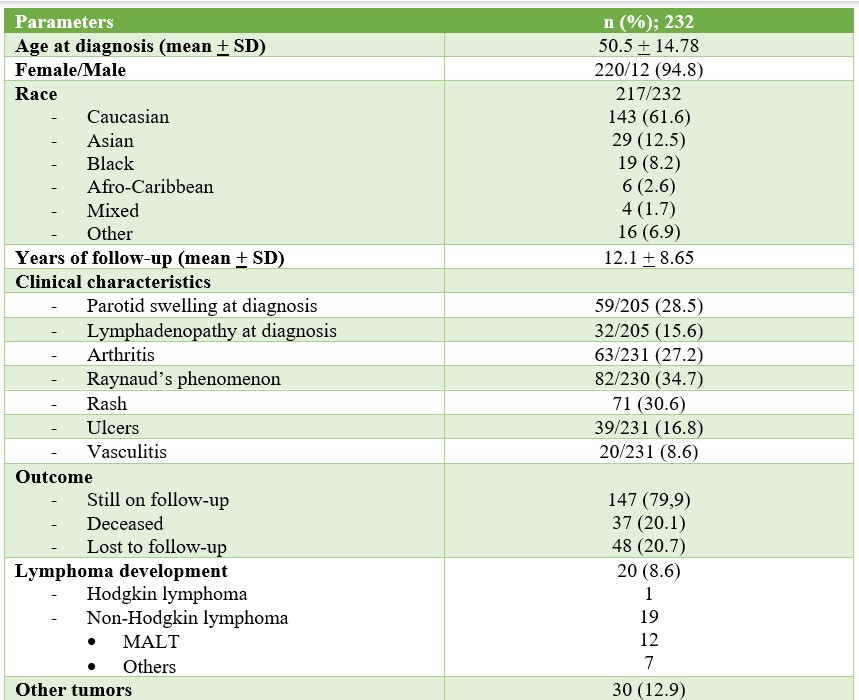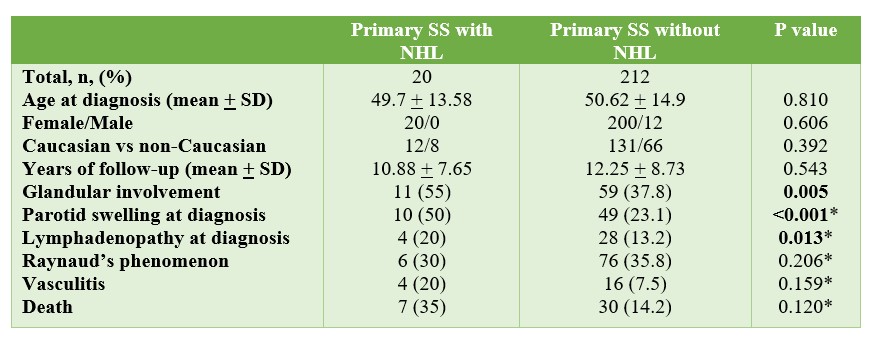Session Information
Date: Tuesday, November 14, 2023
Title: (2177–2194) Sjögren’s Syndrome – Basic & Clinical Science Poster II
Session Type: Poster Session C
Session Time: 9:00AM-11:00AM
Background/Purpose: Primary Sjögren’s syndrome (pSS) is an autoimmune rheumatic disease characterized by lymphocytic infiltration of exocrine glands. Its clinical manifestations are heterogeneous. Currently, the evidence regarding the outcomes of the disease during a long term of follow-up is poor.
We studied a cohort of Sjogren’s syndrome patients followed for up to over 35 years to analyze their outcomes during the course of the disease.
Methods: A cohort of 232 patients who were diagnosed with pSS and under care in a single center (University College London Hospital) between 1984 and December 2022 were retrospectively screened. The authors reviewed case notes, computer records, and primary healthcare databases on an audit basis. Demographic features and clinical features were assessed, as well as the outcome, death, and cause of death. Statistical analysis using frequencies, univariant analysis (χ2 and Fisher’s tests), multivariant analysis, logistic regression, and bivariant analysis were performed.
Results: The mean age at diagnosis was 50.5 years (SD=14.78 years). The mean years of follow-up since diagnosis was 12.1 years (SD= 8.65); 48 patients (20.7%) were lost to follow-up at some point during the study period and 37 patients (20.1%) died during this period. Lymphoma developed in 20 patients. When compared with the rest of the patients, the incidence of glandular manifestations was significantly higher in the lymphoma group (11 [55%] vs 59 [37.8%]; p=0.005). In an independent multivariate regression analysis, parotid swelling at the time of diagnosis was found to be the most important predictive factor (p< 0.001). The majority of lymphomas developed < 15 years post-diagnosis. Death occurred in 37 patients (20%), with a mean age of 80.20 years old (SD=8.547). Infection was the commonest cause of death, followed by malignancy related.
Conclusion: In our very long-term follow-up of Sjogren’s patients, the main complication associated with the disease was related to lymphoma development, which invariably occurred during the first years after diagnosis. In contrast, in our cohort among the patients who died, the majority were over 70 years old, confirming that the disease is clearly compatible with a long-life expectancy. Infection was the commonest cause of death.
To cite this abstract in AMA style:
Montano-Tapia L, Yildrim R, Abrantes A, Isenberg D. 35 Years Follow-up of Primary Sjögren’s Disease: A Single Center Study [abstract]. Arthritis Rheumatol. 2023; 75 (suppl 9). https://acrabstracts.org/abstract/35-years-follow-up-of-primary-sjogrens-disease-a-single-center-study/. Accessed .« Back to ACR Convergence 2023
ACR Meeting Abstracts - https://acrabstracts.org/abstract/35-years-follow-up-of-primary-sjogrens-disease-a-single-center-study/


